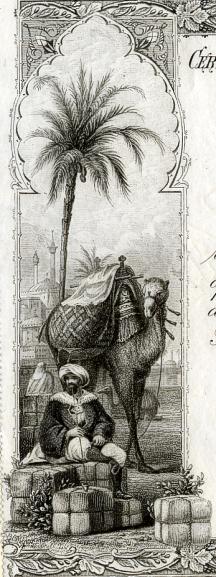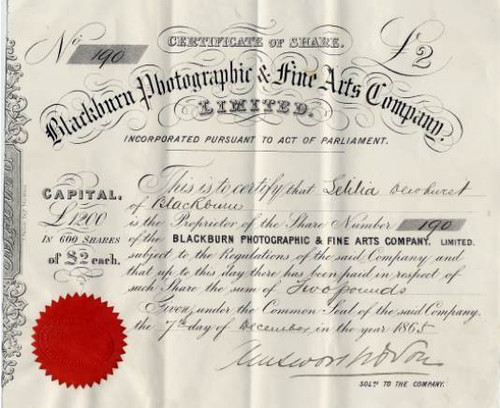Beautifully engraved certificate from the Ottoman Company Limited issued in 1865. This historic document was printed by Bradsbury, Wilkinson & Company and has an ornate border around it with a vignette of an Arab trader, camel, mosque and palm tree in background. Embossed seal. This item has the signatures of the Company's Directors and Secretary and is over 143 years old. 
Certificate Vignette The Ottoman Empire (Ottoman Turkish: دولتِ عَليه عُثمانيه, Devlet-i Aliye-i Osmaniye, literally "Ottoman Sublime State") was an imperial power, centered around the borders of the Mediterranean Sea, that existed from 1299 to 1922. At the height of its power in the 16th century, it included Anatolia, the Middle East, parts of North Africa, and much of south-eastern Europe to Caucasus. It comprised an area of about 19.9 million km², though much of it was under indirect control of the central government. The Empire was situated in the middle East and West, and interacted throughout its six-century history with both the East and the West. It was established by a tribe of Oghuz Turks in western Anatolia and was ruled by the Osmanlı dynasty, the descendants of those Turks. The Empire was founded by Osman I (in Arabic ʿUthmān, عُثمَان , hence the name Ottoman Empire). In 1453, after the Ottomans captured Constantinople (modern İstanbul) (the last remnant of the Byzantine Empire), it became the Ottomans' third capital. In the 16th and 17th centuries, the Ottoman Empire was among the world's most powerful political entities, and the countries of Europe felt threatened by its steady advance through the Balkans and the southern part of the Polish-Lithuanian Commonwealth. At its highest point, the Empire contained many of the important places of classical antiquity, including Homer's Olympus and Dardenus, Zeus' Europa, Io's Bosporus, temple of Diana in Ephesus, sarcophagus of Alexander the Great, Abraham's oasis and wells, the Nile River, the Mount of the Sermon, and the Hill of Golgotha. The dissolution of the Ottoman Empire was a consequence of World War I when Allied forces, including the Arabs, eventually defeated Ottoman forces in the Middle East. At the end of the war the Ottoman government collapsed completely and the empire was divided among the victorious powers. The following couple of years ended with declarations of new states. One of the new states was the Republic of Turkey. The members of the Ottoman dynasty were banned from the lands of Anatolia, where they once built one of the great empires of the world. In 1999, Turkey's parliament granted Turkish citizenship to the members of the Ottoman family, after 76 years. History from Wikipedia and Encyberpedia.

Certificate Vignette














